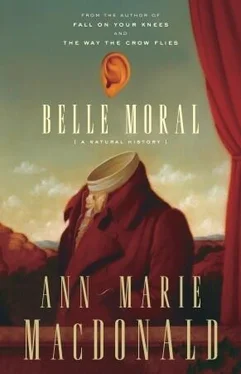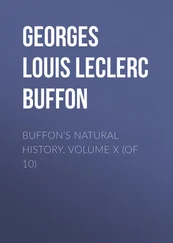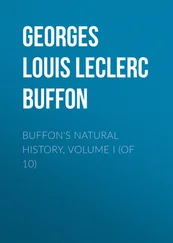PEARL. Why?
VICTOR. Because … As long as I don’t come home, I needn’t feel … [Tears threaten, he forces a smile.] You see, Pearl, I only ever get homesick. When I come home.
PEARL. What’s the matter, Victor? Don’t you want Belle Moral?
VICTOR [shaking his head] . Yes [nodding] . And no. And yes. And no. And –
PEARL. Well which is it?
VICTOR. Both.
PEARL. You can’t have both [to off] . Young Farleigh!
VICTOR. Why not?
PEARL. Because two opposite things cannot be true at the same time.
VICTOR. Yes they can.
PEARL. They cannot.
VICTOR. Indeed they can.
PEARL. Canna.
VICTOR. Can.
PEARL. Then why did you come back?!
VICTOR. I had a dream.
PEARL [exasperated] . Oh, Victor.
VICTOR. I dreamt of Mother. At least, her voice was there. What did she look like, Pearl?
PEARL. You know as well as I. She looked like that [the portrait] . More or less.
VICTOR. No, Pearl. Tell it the right way.
PEARL … [starting to yield] . She was beautiful. Like a queen. That’s why she was called Régine.
VICTOR. What did she sound like?
PEARL. She used to sing.
VICTOR. Sing the song, Pearl.
PEARL. Not now, Victor.
Soft music: Au Claire de la Lune .
VICTOR. In my dream, I was wrapped up snug in that old tartan shawl [the painting] . It was warm like her voice. And soft, not rough as you’d expect of a woolen blanket, but smooth against my face. Like fur. I could smell it. And I felt … [overcome] so well. And I woke up thinking, Mother would have let me have a puppy. [weeping] I know she would.
PEARL. Victor. Please don’t cry, Victor, I’m sorry. Damnit. [singing] “Au claire de la lune, mon ami, Pierrot. Prete moi ta plume, pour écrire un mot. Ma chandelle est morte, je n’ai plus de feu. ouvre moi ta porte, pour l’amour de Dieu.”
VICTOR has been listening, rapt . PEARL makes a move: is she about to hug him? But FLORA enters with a tray of shortbreads and he transforms, ultra cheerful once more, leaving
PEARL a little stung .
FLORA. Here’s a wee pick-an-dab, Victor, sweetie.
VICTOR [suddenly macho] . Ambrosia! [Helping himself.] Pearl, take a proper photograph of me and Auntie. [Singing for FLORA.] “Green grow the rashes, O, The sweetest hours that e’er I spend, Are spent amang the lasses, o!”
FLORA, giggling, delighted .
PEARL [renewed asperity] . I’ve no time for highland games, Victor, I’ve promised a cover photo for the next issue of “The Edinburgh Journal of Rules and Exceptions.”
VICTOR [genial]. I hope you know you’re drowning in a cultural backwater here.
PEARL. Dinna speak to me of cultural tarpits, ma kilted laddie.
VICTOR. I wear this relic in a spirit of pure irony, dear heart, as well as a sure-fire bid to irritate you to the depths of your Protestant soul.
PEARL. Edinburgh may not be at the centre of a great empire, but we are a modern city with a bittie of everything: art, science, golf. Not to mention a leading lunatic asylum; the patients perambulate freely about the grounds and in winter besport themselves on the curling rink. Nor have we any shortage of free-thinkers: there’s an Italian [pron. Eye-talian]green grocer in Princes Street across from the Scott Monument, and you know Rhouridh [pron. Roo-oo-rrry]MacGregor, Jinnie MacGregor’s cousin? He’s become a nihilist. What a waste.
FLORA. That’s what a papist comes to in the end.
VICTOR. Father’s dead, Pearl, you’ve no excuse now, get out and see the world, travel.
FLORA. She intends to book a camel.
PEARL. I can’t go anywhere til you take responsibility for Belle Moral –
VICTOR [enthusing] . To hell with Belle Moral, Pearl the world is changing, it’s cracking open, see it now so you’ll know how unrecognizable it’s about to become: the masses throbbing like a steam engine about to fly from the rails; men throwing off their shackles, women eschewing their corsets, clamouring for suffrage; humanity rising like sap or a lit fuse, and whether we burst into blossom or flame, who can tell? You sit here scribbling a note to send to town, meanwhile the products of the entire globe are at the fingertips of any toff in London with a telephone. Invention has outstripped its mother, necessity; the old ways and the old walls are tumbling, the lines are blurring; art and science set to flood their banks and mingle, can you imagine what their confluence might yield?
PEARL. Mud?
VICTOR. Look at Darwin. Thanks to him, science turns out to be stranger than a Greek myth: are we men or animals?
PEARL. Some of us are women, and we’re all of us animals.
FLORA. We’re not!
VICTOR. Science now tells us what art has been prophesying at the gates for years, namely that we can no longer take the evidence of our senses for granted.
PEARL. Science does that quite regularly. [Enjoying the argument as much as he is.] Until recently, mankind was flummoxed by the question: what is the basic substance of the universe? The apparent “Nothing” through which we and the planets move? The necessary “Something” which lends predictability to our mathematical calculations? That was the question.
FLORA. And, was there an answer?
PEARL. By dint of hard work, indeed there was.
VICTOR. What was it?
PEARL. Oh Victor, luminiferous ether, of course.
He’s never heard of it, nor has FLORA.
VICTOR. Pearl, is it not just possible that this time art is leading the way?; hinting to us that your quest for “substance” might be entirely beside the point. Look at the impressionists–
PEARL. I’d rather not.
VICTOR. Then look at Mother’s painting. Observe the brush strokes; each shimmering with possibility. Like a series of suggestions. Draw back and flux yields to stasis. A man, a woman, two children, solid and certain. Draw near and you lose the edges, so gradually do the colours blend one into another; as though they might give rise to any number of different pictures. Nearer still and they appear disconnected; a collection of random daubs, bald facts, meaningless. Until finally they are mere atoms that seem to dance before one’s eyes. Light turns to matter, and matter to motion. Are we seeing the painting itself, or only one possibility of itself? Is the picture emerging? Or is it fading?
PEARL. I can’t tell, it’s too blurry.
VICTOR. So is life. Mother may have been years ahead of her time.
PEARL. She may have been short-sighted.
FLORA. Ay, she had a stigmata.
VICTOR And what of the composition? Is it intentionally unbalanced as a comment on our family? Or did Mother mean to add another figure before she died?
FLORA [slightly alarmed] . What other figure? There is no other figure.
VICTOR There’s you, Auntie.
PEARL. It’s clear enough to me: Mother never finished anything either.
VICTOR [reasonable] . You can’t see Mother’s painting because you’re looking for vulgar likeness. As in your photograph.
PEARL. Don’t compare Mother’s painting with my photograph. One is art, such as it is, the other is science.
VICTOR. Your photo isn’t science, it’s just bad art.
PEARL. In which case, Mother’s painting is worse science.
VICTOR. Not if science proves that reality is a blur after all.
PEARL. Mother painted what she imagined. I photograph what is there. Art is subjective. Science is objective.
VICTOR. There’s no such thing.
PEARL. Sir Isaac Newton and his apple; gravity; the heliocentric movement of the planets; heat expands, cold contracts, facts. Facts, facts, facts. The scientific method yielding real answers.
Читать дальше












